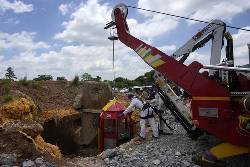CAPE TOWN, South Africa (AP) — South Africa's president is facing calls to order an inquiry into a police operation that was meant to combat illegal mining but ended up leaving 87 miners to die underground as authorities attempted to force them to surrender during a monthslong standoff.
The tragedy at the abandoned gold mine near the town of Stilfontein began to unfold in August, when police cut off food supplies for a period of time to the miners working illegally in the mine's tunnels.
The tactic was apparently meant to force them out but instead caused dozens to die of starvation or dehydration, according to groups representing the miners.
A court ordered a rescue operation that was launched on Monday and more than 240 survivors were hauled out this week in small groups in a metal cage, some of them badly emaciated after more than five months below the surface. All the survivors were arrested, police said.
Here's how the events unfolded:
Operation ‘Close the Hole’
South African authorities have for years struggled to stop groups of miners from going into some of the gold-rich country's 6,000 abandoned or closed mines to search for leftover deposits. According to officials, South Africa lost more than $3 billion in gold to the illicit trade last year.
Police forces launched an operation — dubbed "Close the Hole" — in late 2023 to clamp down on illegal mining by surrounding several mines and cutting off supplies that were being sent down by other members of the groups on the surface, so the miners would come out on their own and be arrested.
The Buffelsfontein Gold Mine, the scene of the disaster, became a police target in August but it was only in November that the miners' situation drew the attention of rights groups. Activists warned that hundreds of miners were trapped up to 2.5 kilometers (1.5 miles) underground and desperately needed food, water and other supplies.
A Cabinet minister laughed when she was asked if the authorities would send supplies.
“We are not sending help to criminals,” Khumbudzo Ntshavheni said, adding that "criminals are not to be helped. Criminals are to be persecuted.”
Starvation as a weapon
Trade unions and rights groups say authorities used starvation as a weapon at Buffelsfontein. A group representing the miners said that not only did police cut off food for a time, they and the mine owners also dismantled a rope and pulley system that was used to get into the mine and send down supplies.
Police have denied any responsibility for the deaths and insisted the miners were not trapped but were able to escape through several shafts in the mine.
More than 1,500 did, police said, but others stayed put out of fear they would be arrested.
But rights groups say hundreds of miners were trapped inside the mine too far away from the shafts they could leave through or too weak to make the dangerous climb out.
Activists are saying authorities are also to blame for the long delay in launching a rescue operation, which only started on Monday after a court ordered the government to rescue the miners.
Who are the miners?
The miners, known as “zama zamas” — “hustlers” or “chancers” in the Zulu language — are usually armed and part of criminal syndicates, the government says.
They are often undocumented foreign nationals and authorities said that the vast majority who came out of the Buffelsfontein mine were from Mozambique, Zimbabwe and Lesotho, and were in South Africa illegally.
Police said they seized gold, explosives, firearms and more than $2 million in cash from the miners and have defended their hard-line approach.
Appeals for the president to order an inquiry
South Africa's second biggest political party, which is part of a government coalition, has called on President Cyril Ramaphosa to order an inquiry into what happened at the Buffelsfontein mine.
The investigation should also determine whether police “are prepared to use vengeance and punishment as acceptable ways of fighting illegal mining," the Democratic Alliance party said.
Others have questioned if the extraordinarily harsh action by authorities was because most of the miners at Buffelsfontein were not South Africans, but undocumented migrants.
Ramaphosa has not commented on the disaster.
___
AP Africa news: https://apnews.com/hub/africa
...


